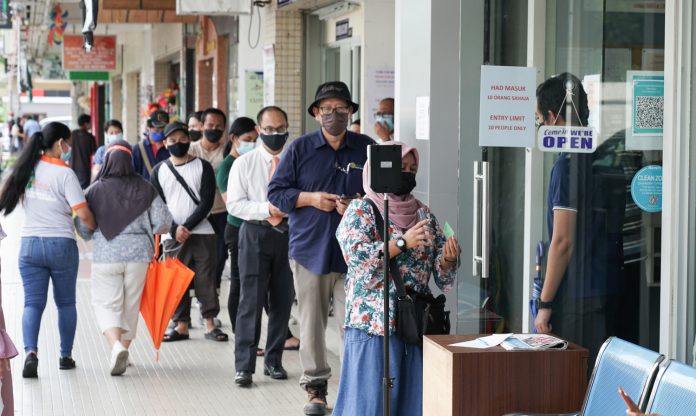
Brunei will enter a transition phase this November 19 which will see the phased re-opening of previously closed establishments and business premises to those who are fully vaccinated.
Seventy per cent of the Brunei population must be fully vaccinated by November 19 for the country to officially enter the transition phase under the National COVID-19 Recovery Framework.
With new daily COVID-19 cases dropping and recoveries increasing, the number of active cases in the country has dropped below 900 for the first time in nearly three months.
Sixty seven per cent of Brunei residents are fully vaccinated as of yesterday, which the Minister of Health YB Dato Dr Hj Mohd Isham Hj Jaafar said is a few weeks “ahead of schedule” of their original target date for a 70% vaccination rate.
Approximately 13,000 additional residents need to receive their second doses for the 70% target to be achieved.
Although the government postponed second dose appointments for some residents in order to begin administering first doses to 38,201 adolescents (12 to 17-years-old) in the next two weeks, the Ministry of Health (MoH) announced that residents can receive their second doses through walk-ins from November 9 to 21.
The beginning of the transition phase will be known as Operasi Peralihan or Transition Operation, where the evening stay-at-home period will be shortened to 10pm till 4am until November 30, replacing the Operasi Pulih or Recovery Operation period of 8pm till 4am which will end this November 18.

Re-opening of previously closed establishments
The most prominent feature of the transition phase is the re-opening of establishments that were previously closed in August at the onset of the second wave.
Re-opening under this new phase include: mosques and other places of worship; higher education institutions along with technical/vocational and driving schools; dining facilities at eateries; beauty salons and barbershops; sports facilities; and recreational facilities including cinemas, arcades and playgrounds.
Venues for personal events such as weddings are also permitted.
These establishments or premises can only accept people that are fully vaccinated, and are limited to 50% capacity or 200 persons – whichever is less. Mosques will have a pre-determined capacity that may exceed the 200 persons, depending on their respective sizes with distancing measures between worshippers in place.
Face masks and BruHealth scanning are mandatory, and physical distancing of 1.5 metres between people must be maintained. Antigen Rapid Tests (ART) should also be done regularly. When dining in, customers can only take of their masks when eating or drinking.
Learning institutions permitted to operate under the transition phase must conduct ARTs every two weeks for students and employees. Fully vaccinated civil servants will also be allowed to return to their workplaces while the government maintains shortened working hours from 8am to 2pm.
Meanwhile gatherings are private residences between 10 to 30 persons are permitted for the fully vaccinated, subject to the size of the residence to allow safe distancing within.
Transition phase as a trial before endemicity
National-COVID-19-Recovery-Framework-1Under the government’s recovery framework, the transition phase will be followed by the endemic phase when 80% of the population is fully vaccinated.
Second Minister of Finance and Economy and Minister at the Prime Minister’s Office YB Dato Seri Setia Dr Hj Mohd Amin Liew Abdullah said the transition phase would provide valuable feedback for public health management on how COVID-19 will fare under a gradual de-escalation of restrictions amongst a highly vaccinated population.
The government steering committee for COVID-19 is also looking into proposals to impose a fee for ARTs in the endemic phase for unvaccinated people who intend on accessing government or business premises in the country.











